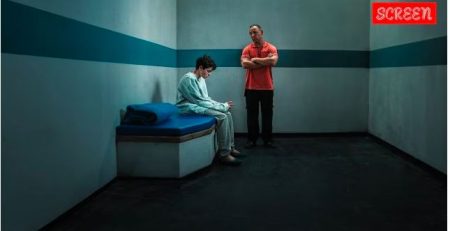Criminal Record review: New Apple show is the British antithesis to Delhi Crime; it’s addictive but not unmissable
Share this post
A tendency to misdirect dilutes Apple’s new crime-thriller series, Criminal Report. Written by Paul Rutman, the eight-episode show pits two London detectives — one a veteran of the police force and the other a wet-behind-the-ears rookie — against each other, when a seemingly dead and buried old murder case beckons from beyond the grave. What follows is a cat-and-mouse game that functions better as a psychological thriller than as a socially responsible police procedural.
Played by Cush Jumbo, Detective Sergeant June Lenker comes across a distress call from a young woman, who tells the operator in hushed tones that her life is in danger. Her boyfriend, she claims, is also responsible for a murder of another young woman that took place over a decade ago. A Black man by the name of Errol Mathis was convicted and sentenced to 24 years in prison for that crime, but the woman believes that Mathis is innocent. DS Lenker discovers that the investigating officer in the case was the infamous Detective Inspector Daniel Hegarty, a no-nonsense Glaswegian played in the show by the searingly intense Peter Capaldi.
Best known for his comedic performance as the foul-mouthed political publicist Malcolm Tucker in The Thick of It, Capaldi is magnetic from start to finish. Hegarty is a complex man, written to resemble a moustache-twirling villain in one scene, and a whip-smart anti-hero in another. But the show itself is never able to live up to his performance. Far too often, Criminal Record relies on plot-armour to allow the story to proceed. In shows like this, a lot rides on the endings, and while Criminal Record’s climax is thematically consistent with the preceding eight episodes, narratively, it feels like a cop-out. A last-minute plot twist is positively criminal.
But we can’t discuss it here. What we can talk about, however, is the route that the show takes to get to it. Like so many contemporary crime-thrillers, Criminal Record has more on its mind than just empty twists and turns. The series investigates ingrained racism and institutional corruption, and their place in modern-day policing. Lenker is acutely aware that she’s a minority — a Black woman in an organisation dominated by middle-aged white men — and this informs a lot of her decision-making. In one scene, she is literally told that she’s a ‘token’ hire.
Hegarty is equally aware of his own race privileges, but not in a progressive way. When Lenker first approaches him with information about the anonymous tip-off, against her immediate superior’s advice, Hegarty immediately goes on the defensive. The world was a very different place a decade ago, when he and his ‘boys’ gaslit Mathis into a confession. But the show’s timely central themes are often drowned under its commitment to serve the genre.
While Lenker and Hegarty play predator and prey, Criminal Record introduces a string of peripheral characters whose only job is to nudge the narrative forward. They exist not as people, but as plot devices. There was plenty of opportunity, for instance, for the show to examine Lenker’s oddly placid relationship with her white husband Leo, especially when her own son is racially profiled by the cops. But the show rushes through this subplot at top speed. Obstacles pop up at appropriately annoying times, and they’re overcome just as conveniently. On one occasion, a woman shows up and informs Lenker of a ‘rumour’ that she has heard, just when she’d run out of options. And this puts her on the right track.
New developments on the personal front politely make way for the investigation to progress, and vice-versa. Even though both Lenker and Hegarty have plenty going on their lives, they never really seem overwhelmed by it all. This could admittedly be because they’re composed individuals in general, but the show doesn’t give them, Lenker in particular, a moment to process all of this. In addition to her son being framed for drug possession, Lenker’s car is set on fire, she’s investigated for workplace bullying, and her mother’s Alzheimer’s gets worse. You wouldn’t be able to tell if you watch just the final scene. Meanwhile, Hegarty is given a wayward teenage daughter to deal with.
None of this is as satisfying as the scenes in which Jumbo and Capaldi go toe-to-toe. The two actors are in impeccable form; Lenker and Hegarty’s isn’t just a clash of generations, but also of ideologies and politics. They’re seeking the truth. But the scariest suggestion that Criminal Record makes is that the truth is often malleable. Hegarty sent Mathis to prison not because he, Hegarty, was an inherently crooked man, but because he actually believed that Mathis was guilty; his investigation was coloured by his unexamined prejudices. The show aims not to glorify an institution in severe need of reevaluation, but to expose its flaws with urgency and sensitivity. And in that regard, it’s the antithesis of Netflix’s Delhi Crime.












Leave a Reply